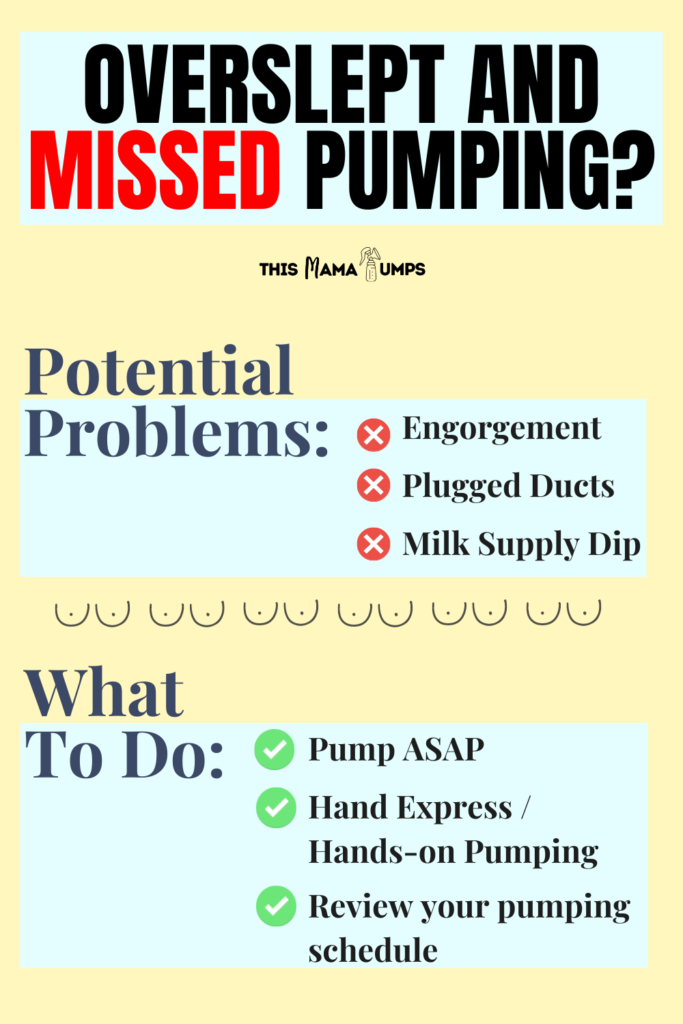Waking up in a panic after oversleeping and missing a pumping session is a common experience for breastfeeding and pumping moms.
Whether you’re pumping exclusively or supplementing breastfeeding, the missed session can lead to feelings of stress, engorgement, and worry about milk supply.
But don’t fret! Here’s a guide to help you navigate this situation.

Understanding the Impact of a Missed Pumping Session:
Engorgement
Your breasts may feel full, tight, and even uncomfortable.
This is due to milk accumulating in the breast tissue, which can put pressure on surrounding structures.
Engorgement can also make it difficult for your baby to latch on properly during breastfeeding.
Potential for Plugged Ducts
Missing a pumping session can increase the risk of milk ducts becoming blocked.
These blockages occur when milk doesn’t flow freely through the tiny tubes in your breasts.
Plugged ducts can cause tender lumps in your breast and may sometimes be accompanied by a low-grade fever or chills.
Milk Supply Concerns
It’s natural to worry about your milk supply decreasing after missing a pumping session.
However, the good news is that your body is designed to meet your baby’s feeding needs.
One missed session typically won’t have a significant impact on your overall supply.
In fact, your body may compensate by producing more milk at your next pumping session.
If you’re exclusively pumping, however, or have concerns about your supply in general, consulting with a lactation consultant can be helpful.
What to Do Immediately:
- Pump as Soon as You Can: The first step is to pump as soon as you wake up. This helps to relieve engorgement and gets you back on track.
- Hand Express or Massage: If your breasts are very full, gently hand express or massage them before pumping to soften them up and encourage milk flow.
- Hydrate: Drink plenty of water to help your body produce milk.
- Warm Compress: Applying a warm compress to your breasts before or during pumping can help stimulate milk flow.
- Pain Relief: If you’re experiencing pain, over-the-counter pain relievers like ibuprofen can help.
How To Get Back On Track
1. Resume Your Pumping Routine
Try to return to your normal pumping schedule as soon as possible.
Consistency is key to maintaining a good milk supply.
If you’re used to pumping every 3 hours, aim to get back to that rhythm as soon as you can after your missed session.
Even if you can’t pump for your full usual duration at first, any amount of expressed milk is helpful.
2. Monitor Your Baby
Watch for any changes in your baby’s feeding patterns or diaper output.
A breastfeeding baby should typically feed at least 8-12 times in a 24-hour period, and their pee diapers should be pale yellow and their poopy diapers should be soft and mustard-colored.
If you notice a decrease in feeding frequency or wet diapers, it could be a sign that your milk supply is dipping.
3. Adjust as Needed
Be flexible and adjust your pumping schedule slightly if needed.
For example, you may want to pump more frequently for a short period to help rebuild your supply.
You can also try power pumping, which involves pumping for shorter intervals (20 minutes) with more frequent breaks (10 minutes) over a two-hour period. This can help stimulate milk production.
4. Consult a Lactation Consultant
If you’re concerned about your milk supply or experiencing any issues like persistent engorgement, plugged ducts, or pain, don’t hesitate to seek professional guidance.
A lactation consultant can assess your situation, provide personalized advice, and help you develop a plan to get your breastfeeding journey back on track.
Important Reminders:
- Don’t Panic: One missed pumping session won’t derail your breastfeeding journey.
- Listen to Your Body: Pay attention to your body’s signals and adjust your pumping schedule as needed.
- Self-Care: Oversleeping can be a sign of exhaustion. Make sure you’re prioritizing rest and getting enough support from your partner, family, and friends.
Key Takeaway
Missing a pumping session is a common experience for many moms. While it can be stressful, it’s important to remember that your body is resilient.
By taking prompt action, returning to your routine, and practicing self-care, you can easily navigate this bump in the road.
